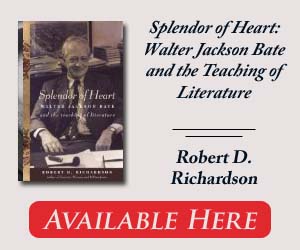Splendor of Heart: Walter Jackson Bate and the Teaching of Literature, by Robert D. Richardson, with an interview by John Paul Russo, David R. Godine, 127 pp., $19.95
Walter Jackson Bate (1918–1999)—called Jack by his friends—arrived at Harvard in 1935 and stayed for the rest of his life. A specialist in what we would now call the long 18th century (1660–1820), Bate wrote Pulitzer Prize–winning books on Keats and Samuel Johnson, coedited the standard editions of Coleridge’s Biographia Literaria and Johnson’s essays, and compiled the important textbook Criticism: The Major Texts. His best-known course, “The Age of Johnson,” was, from all reports, electrifying, transformative, unforgettable.
“Outside the lecture hall,” writes his former student Robert D. Richardson in Splendor of Heart, “Bate was not a prepossessing figure.”
Of middling height and weight, wearing old shoes and with a shock of unruly hair, he disdained briefcases and carried his books and papers in a green bookbag slung over his shoulder. He preferred comfortable baggy old pants and worn tweed jackets. His necktie was never tied right. He might go out and buy a new set of clothes from J. Press, the shop that specialized in clothing for clubbies and preppies, but the moment Bate put the clothes on they would look as though he had slept in them outdoors for a week. He smoked incessantly, mostly cigarettes, but also a pipe. His clothes and all his furniture were covered with ashes … He usually had a farmer’s haircut; his ears stuck out, but his eyes were quick and missed nothing. He had a wide mobile mouth and a quick delighted smile, and he talked using his hands. He always had something wrong with him.
While other scholars might practice the microscopy of New Criticism or dazzle students with the latest European critical theory, Bate believed that literature was, above all, humanistic. A great book, like a noble life, spoke to the deepest part of our being, providing inspiration, solace, and guidance in how to live. As a teacher, Bate adopted as his mantra an observation from the philosopher Alfred North Whitehead (whom he knew): “Moral education is impossible apart from the habitual vision of greatness.”
It is this conviction that has made Bate’s biography of Samuel Johnson the intellectual’s go-to comfort book. As Richardson writes, partly quoting Bate, it “shows us a man born in obscurity and full of physical defects (scrofula, poor eyesight, an open sore on his arm as a boy), raised in poverty, with ‘everything against him, including painful liabilities of personal temperament, a turbulent imagination, acute anxiety, aggressive pride, extreme impatience, radical self-division and self-conflict.’ ” In Bate’s heroic portrayal, Johnson earned his moral wisdom through fierce and unrelenting effort.
In the long interview that makes up the second part of this book, Bate tells John Paul Russo that he turned to biography because he found himself gripped—his italics—“by the drama of an individual life.” Consequently he wanted his accounts of Keats and Johnson to replicate the psychological richness and narrative excitement of a 19th-century Bildungsroman. For just this reason, some scholars have viewed the Johnson biography as rather too colorful and novelistic, almost a vie romancée.
“> Teaching was crucial to Bate, and Splendor of Heart passes along many of his pedagogical principles. To read poetry aloud with the greatest effect, one should go slowly and “observe all possible pauses extravagantly.” Lecturers should polish their delivery, convey love and enthusiasm for their subject, and learn to speak without a typescript. They should also “plunge at once into what is important,” then add background or factual matter as they proceed. To appeal to a diverse audience, he strongly urged a zigzag approach, one in which the speaker emphasized fundamentals while occasionally inserting bits of specialized or demanding material for the more sophisticated listeners.
Teaching was crucial to Bate, and Splendor of Heart passes along many of his pedagogical principles. To read poetry aloud with the greatest effect, one should go slowly and “observe all possible pauses extravagantly.” Lecturers should polish their delivery, convey love and enthusiasm for their subject, and learn to speak without a typescript. They should also “plunge at once into what is important,” then add background or factual matter as they proceed. To appeal to a diverse audience, he strongly urged a zigzag approach, one in which the speaker emphasized fundamentals while occasionally inserting bits of specialized or demanding material for the more sophisticated listeners.
Although Splendor of Heart is an affectionate and winning portrait of a scholar, it could have been better. Richardson’s memoir comes across as somewhat loosely written, rambling and even repetitive, which is surprising given the incisive brilliance of his own biographies of Thoreau, Emerson, and William James. By contrast, Russo’s interview, though fine, seems a little too high-minded and respectful. For example, he might have asked his former teacher about his passion for the adventure fiction of Rider Haggard, Rafael Sabatini, and Olaf Stapledon. Why these particular authors?
Walter Jackson Bate believed that a good reader possesses “intensity and empathy” and that literature was, above all else, “an expression of human experience.” Cavils aside, to be reminded of these truths is just one of the many pleasures of Splendor of Heart.

